News and Comment.
Page 10
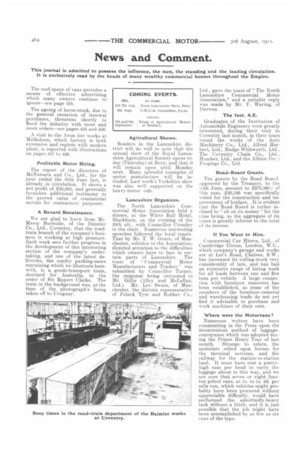
Page 11
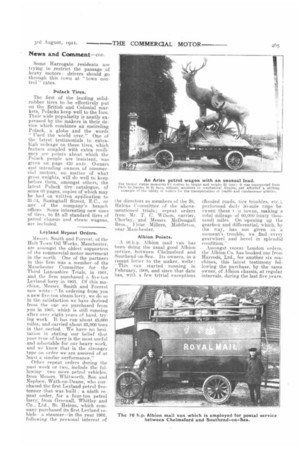
Page 12
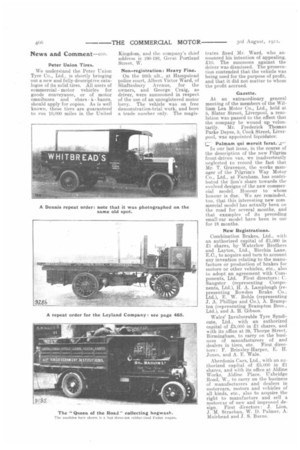
Page 13
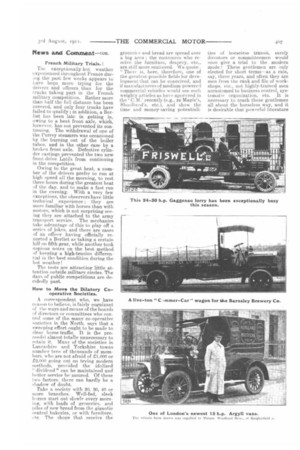
Page 14
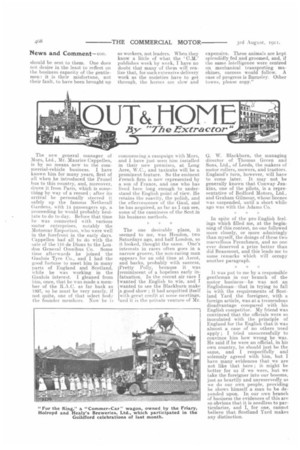
If you've noticed an error in this article please click here to report it so we can fix it.
This journal is admitted to possess the influence, the men, the standing and the leading circulation. It is exclusively read by the heads of many wealthy commercial houses throughout the Empire.
The roof-space of vans provides a means of effective advertising which many owners continue to ignore—see page 455.
The ageing of horse-stock, due to the general cessation of renewal purchases, threatens shortly to flood the industry with more and more orders—see pages 455 and 456.
A visit to the Avon tire works at Melkshatn, which factory is both extensive and replete with modern plant, is reported with illustrations on pages 457 to 459.
Profitable Motor Hiring.
The report of the directors of McNamara and Co., Ltd., for the year ended the 30th June last, is already in circulation. It shows a net profit of 220,953, and generally furnishes additional testimony to the proved value of commercial motors for contractors' purposes.
A Renard Renaissance.
We are glad to learn from Mr. Massy Burnside, of the Daimler Co., Ltd., Coventry, that the roadtrain branch of the company's business is working at high pressure. Each week sees further progress in the development of this interesting section of the company's undertaking, and one of the latest deliveries, the sundry packing-cases containing which we illustrate herewith, is a goods-transport train, destined for Australia, to the order of Sir Rupert Clarke. The train in the background was, at the time of the photograph's being taken off to Uruguay. Agricultural Shows.
Readers in the Lancashire district will do well to note that the annual show of the Royal Lancashire Agricultural Society opens today (Thursday) at Bury, and that it will remain open until Monday next. Many splendid examples of motor manufacture will be included. Last week's Yorkshire show was also well supported on the heavy-motor side.
Lancashire Organizes.
The North Lancashire Commercial Motor Association held a dinner, at the White Bull Hotel, Blackburn, on the evening of the 25th ult., with Councillor Crossley in the chair. Numerous interesting speeches followed the loyal toasts. That by Mr. T. W. Grace, of Manchester, solicitor to the Association, directed attention to the difficulties which owners have to face in certain parts of Lancashire. The toast of 'Commercial Motor Manufacturers and Traders was submitted by Councillor Turner, the response being entrusted to Mr. Gillis (Alley and McLellan, Ltd.). Mr. Leo Swain, of Manchester, the district representative of Polack Tyre and Rubber Co., Ltd., gave the toast of "The North Lancashire Commercial Motor Association," and a suitable reply was made by Mr. F. Waring, of Darwen.
The Inst. A.E.
Graduates of the Institution of Automobile Engineers were greatly interested, during their visit to Coventry last month, in their tours round the works of the Auto Machinery Co., Ltd,, Alfred Herbert, Ltd., Rudge-Whitworth, Ltd., The Coventry Chain Co., Ltd., Humber, Ltd., and the Albion Dre2 Forgings Co., Ltd.
Road-Board Grants.
The grants by the Road Board approved by the Treasury, to the 3uth June, amount to £275,390; of this sum, 220,166 was specifically voted for the construction and improvement of bridges. It is evident that the Road Board is rather inclined to " sit on its money" for the lime being, as the aggregate of its xotes is greatly inferior to the total of its income.
If You Want to Hire.
Commercial Car Hirers, Ltd., of Cambridge Circus, London, W.C., which company's garage and works are at Lot's Road, Chelsea, S.W., has increased its rolling-stock very considerably of late, and has had an extensive range of hiring work for all loads between one and five tons per vehicle. A large connection with furniture removers has been established, as some of the members of the furniture-removal and warehousing trade do not yet find it advisable to purchase and work machines of their own.
Where were the Motorvans ?
Numerous writers have been commenting in the Press upon the inconvenient method of luggageconveyance which was adopted during the Prince Henry Tour of last month. Strange to relate, the motorists relied upon horses for the terminal services, and the railway for the station-to-station haul. It must have cost a prettyhigh sum per head to carry the luggage about in this way, and we are sure that seven or eight fourton petrol vans, at ls. to is. 2d. per mile run, which vehicles might probably have been procured without appreciable difficulty, would have performed the admittedly-heavy task without a hitch, and it is just possible that the job might have been accomplished by as few as six vans of the type.
Some Harrogate residents are trying to restrict the passage of heavy motors : drivers should go through this town at "town control " rates.
Polack Tires.
The first of the leading solidrubber tires to be effectively put on the British and Colonial markets, Polacks keep well to the fore. Their wide popularity is neatly expressed by the makers in their device which combines an encircling Polack, a globe and the words " Used the world over." One of the latest testimonials to extrahigh mileage on these tires, which feature coupled with extra resiliency are points about which the Polack people are insistent, was given on page 430 ante. Owners and intending owners of commercial motors, no matter of what gross weights, will do well to keep before them, amongst others, the latest Polack tire catalogue, of some 60 pages, copies of which may be had on written application to
:Rasinghall Street, E.C., or any of the company's branch offices. Some interesting new sizes of tires, to fit all standard tires of petrol chassis and steam wagons, are included.
Leyland Repeat Orders.
Messrs. Smith and Forrest, of the Holt Town Oil Works, Manchester, are amongst the oldest supporters of the commercial-motor movement in the north. One of the partners in this firm was a• member of the Manchester Committee for the Third Lancashire Trials, in 1901, and the firm purchased a five-ton Leyland lorry in 1903. Of this machine, Messrs. Smith and Forrest now write: "in ordering from you a new five-ton steam lorry, we do so in the satisfaction we have derived from the one we purchased from you in 1903, which is still running after Oyer eight years of hard, trying work. It has run about 45,000 miles, and carried about 23,000 tons in that Period. We have no hesitation in stating our belief that your type of lorry is the most useful and adaptable for our heavy work. and we know that in the stronger type on order we are assured of at least a similar performance."
Other repeat orders during the nast week or two, include the following ! two more petrol vehicles. from Messrs. Whitworth, Son and Nephew. Wath-on-Deane, who purchased the first Leyland petrol fivetonner that was built. ; a ninth repeat order, for a four-ton petrol lorry, from Greenall, Whitley and Co., Ltd., St. Helens, which company purchased its first Leyland vehiclea steamer—in the year 1902. following the personal interest of the directors as members of the St. Helens Committee of the abovementioned trials ; repeat orders from Mr. T. C. Wilson, carrier, Chorley, and Messrs. McDougall Bros. Flour Millers, Middleton, near Bros.,
Albion Points.
A 16-h.p. Albion mail van has been doing the usual good Albion service, between Chelmsford and Southend-on-Sea. Its owners, in a recent letter to the. maker, write: " This van started running in February, 1908, and since that date has, with a few trivial exceptions (flooded roads, tire troubles, etc.), performed daily 50-mile trips between these t ...el towns, making a total mileage of 60,000 (sixty thousand) miles. On opening up the gearbox and differential, which, by the way, has not given us a moment's trouble, we find every gearwheel and bevel in splendid condition."
Amongst recent London orders, the Albion Co. has booked one from Harrods, Ltd., for another six machines, this latest testimony following the purchase, by the same owner, of Albion chassis, at regular intervals, during the last five years. Peter Union Tires.
We understand the Peter Union Tyre Co., Ltd., is shortly bringing out a new and fully-descriptive catalogue of its solid tires. All users of commercial motor vehicles for goods conveyance, or of motor omnibuses and chars banes, should apply for copies. As is well known, these tires are guaranteed to run 10,000 miles in the United
Kingdom, and the company's chief address is 190-192, Great Portland Street, W.
Non-registration: Heavy Fine.
On the 28th ult., at Hampstead police court, Albert Victor Ward, of Shaftesbury Avenue, for the owners, and George Craig, as driver, were summoned in respect of the use of an unregistered motor lorry. The vehicle was on free demonstration-trial work, and bore a trade number only. The magis trates fined Mr. Ward, who announced his intention of appealing, 210. The summons against the driver was dismissed. The prosecution contended that the vehicle was being used for the purpose of profit, and that it did not matter to whom the profit accrued.
Gazette.
At an extraordinary general meeting of the members of the William Lea Motor Co., Ltd., held at 5, Slater Street, Liverpool, a resolution was passed to the effect that the company be wound up voluntarily. Mr. Frederick Thomas Parke Deyes, 5, Cook Street, Liverpool, was appointed liquidator.
Pallnam qui meruit ferat.
In our last issue, in the course of the description of the new Pilgrim front driven van, we inadvertently neglected to record the fact that Mr. T. Gravenor, the works manager of the Pilgrim's Way Motor Co., Ltd., at Farnham, has contributed the lion's share towards the evolved designs of the new commercial model. Honour to whom honour is due. We are reminded, too, that this interesting new commercial model has actually been on the road for several months, and that examples of its preceding small-car model have been in use for 18 months.
New Registrations.
Combination Brakes, Ltd., with an authorized capital of £1,000 in 21 shares, by Waterlow Brothers and Layton, Ltd., Birchin Lane, EC., to acquire and turn to account any invention relating to the manufacture or production of brakes for motors or other vehicles, etc., also to adopt an agreement with Components, Ltd. First directors : C. Sangster (representing Components, Ltd.), H. A. Lamplough (representing Bowden Brake Co., Ltd.), E. W. Bohle (representing J. A. Phillips and Co.), A. Brampton (representing Brampton Bros., Ltd.), and A. H. Gibson.
Wales' Invulnerable Tyre Syndicate, Ltd., with an authorized capital of £5,000 in -21 shares, and with its office at 39, Thorpe Street, Birmingham. to carry on the business of manufacturers of and dealers in tires, etc. First directors F. Brinsley-Harper, E. H. Jones, and A. E. Wale.
Aberdonia Cars, Ltd., with an authorized capital of £5,000 in El shares, and with its office at Aldine Works, Aldine Place, Uxbridge Road, W., to carry on the business of manufacturers and dealers in motorcars, motors and vehicles of all kinds, etc., also to acquire the right to manufacture and sell a motorcar of new and improved de sign. First directors : J. Lion, J. M. Strachan, W. D. Palmer, A. Muirhead and J. S. Burns. French Military Trials.: The exceptionally-hot weather experienced throughout France during the past few weeks appears to have been more trying for the drivers and officers than for the trucks taking part in the French military competition. Rather more than half the full distance has been covered, and only four trucks have failed to qualify ; in addition, a Berliet has been late in getting in, owing to a bent front axle, which, however, has not prevented its continuing. The withdrawal of one of the Purrey steamers was occasioned by the burning out of the boiler tubes, and in the other case by a broken front axle. Defective cylinder castings prevented the two new front-drive Latils from continuing in the competition.
Owing to the great heat, a number of the drivers prefer to run at high speed all the morning, to rest three hours during the greatest heat of the day, and to make a fast run in the evening. With a very few exceptions, the observers have little tech n i cal experience; they are more familiar with horses than with motors, which is not surprising seeing they are attached to the army transport service. The mechanics take advantage of this to play off a series of jokes, and there are cases of an officer having officially renorted Berliet as taking a certain hill on fifth gear, while another took copious notes on the best method of keeping a high-tension differential in the best condition during the hot weather!
The tests are attracting little attention outside military circles. The days of public competitions are decidedly past.
How to Move the Dilatory Cooperative Societies.
A correspondent who, we have reason lo believe, is fairly cognizant of the ways and means of the boards of directors or committees who eontrol some of the many co-operative societies in the North, says that a sweeping effort ought to be made to clear horse-traffic. It is (he proceeds) almost totally unnecessary to retain it. Many of the societies in Lancashire and Yorkshire towns number tens of thousands of members, who are not afraid of 21,000 or £2,000 going out on trying modern methods, provided the idolized " dividend " can be maintained and hotter service be assured. Of these two factors. there can hardly be a shadow of doubt.
Take a society with 20, 30, 40 or more branches. Well-fed, sleek horses start out slowly every morning, with loads of groceries, and piles of new bread from the gigantic eentral bakeries, or with furniture, ct.e. The shops that receive the
groceries and bread are spread over a big area ; the customers who receive. the iurniture, drapery, etc., are still more scattered. We quote "There is, here, therefore, one of the greatest-possible fields for development that can be conceived, and if manufacturers of medium-powered commercial vehicles would use such weighty articles as have appeared in the C.M.' recently (e.g., re Maple's, Shoolbred's, etc.), and show the time arid money-saving potentiali ties of horseless transit, surely directors or committeemen would soon give a trial to the modern mode'? These gentlemen are only elected for short terms—as a rule, say, three years, and often they are men from the rank and file of workshops, etc., not highly-trained men accustomed to business control, systematic organization, etc. It is necessary to teach these gentlemen all about the horseless way, and it is desirable that powerful literature should be sent to them. One does not desire in the least to reflect on the business capacity of the gentlemen: it is their misfortune, not their fault, to have been brought up as workers, not leaders. When they know a little of what the 'C.M.' publishes week by week, I have no doubt that many of them will realize that, for such extensive delivery work as the societies have to get through, the horses are slow and expensive. These animals are kept splendidly fed and groomed, and, if the same intelligence were centred on mechanical transporting machines. success would follow. A case of progress is Barnsley. Other towns, please copy!'






















